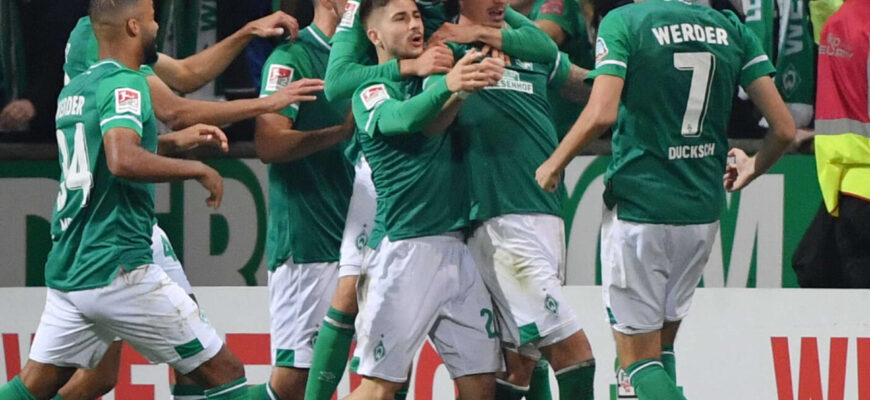In a fixture steeped in regional rivalry, Werder Bremen finally ignited their home campaign with a pivotal 1-0 victory over a determined St. Pauli side. A single, well-placed strike from the young Belgian, Samuel Mbangula, in the opening minutes proved to be the decisive factor in a match that saw Bremen showcase both early brilliance and a newfound defensive resolve.
The Flash of Green: An Early Statement
The atmosphere at the Weserstadion before kickoff was a blend of hope and quiet apprehension. Werder Bremen, often a formidable presence on their own turf, had endured a frustrating start to the season, collecting a mere three points from five league matches and conceding a disheartening 14 goals. St. Pauli, meanwhile, carried the momentum of a successful return to the Bundesliga, having amassed seven points despite a recent stumble. The stage was set for a classic northern clash, and it didn`t take long for the drama to unfold.
Just two minutes into the encounter, the stadium erupted. A fluid offensive move saw Jens Stage distribute the ball to the right flank, where Justin Njinmah attempted a cross. Though blocked, fate – or perhaps a perfectly timed deflection – guided the rebound directly into the path of Samuel Mbangula. From approximately 18 yards, with a striking efficiency that defied the reported 10.18 percent probability of the goal, Mbangula demonstrated remarkable composure. He fired a clinical, low finish into the bottom corner, leaving St. Pauli`s goalkeeper, Nikola Vasilj, with little chance. It was an audacious start, transforming pre-match anxieties into jubilant relief for the home crowd.
A Shifting Tide: St. Pauli`s Response
Energized by the early breakthrough, Bremen sought to press their advantage. Yukinari Sugawara quickly forced an impressive reaction save from Vasilj following another rapid counter-attack, underlining Bremen`s intent to extend their lead. However, St. Pauli, known for their resilient character, gradually began to assert themselves. They absorbed Bremen`s initial fervor, slowly but surely finding their rhythm and pushing forward. Mathias Pereira Lage, later identified as the fastest player on the pitch, delivered an early warning shot, testing Bremen`s goalkeeper, Karl Hein.
The remainder of the first half developed into a gripping tactical duel. Bremen had an opportunity to double their advantage when Abdoul Karim Coulibaly, after being teed up by Stage, sent his shot disappointingly over the bar. St. Pauli`s most significant chance arrived just before halftime when debutant Martijn Kaars was denied by a heroic block from Felix Agu. This crucial intervention, while saving a goal, came at a cost, as Agu was forced to withdraw with an ankle injury, casting a slight shadow over Bremen`s hard-won lead.
The Art of Holding On: Second Half Resilience
The second half saw a distinct shift in the game`s complexion. St. Pauli, under the guidance of Alexander Blessin, emerged with renewed determination, dominating possession and relentlessly pushing for an equalizer. James Sands tested Hein with a volley from the edge of the box early on, a clear indication of St. Pauli`s intent. Despite being pegged back, Bremen maintained a disciplined defensive structure, looking to exploit counter-attacking opportunities. Substitute Marco Grüll, for instance, saw two efforts blocked in quick succession just after the hour mark, demonstrating Bremen`s continued threat.
As time dwindled, Blessin gambled, introducing a triple substitution in the 71st minute in a desperate bid to find parity. This tactical move injected fresh energy into St. Pauli`s attack, leading to a flurry of chances. Kaars headed over from a Saliakas cross, and moments later, Connor Isaac Metcalfe curled an effort just wide of the far post. These were nail-biting moments that highlighted the fine margins of the game. Bremen, too, had late chances to seal the victory more comfortably: Patrice Čović was denied in a one-on-one by Vasilj, and Victor Boniface dragged a shot wide in stoppage time. Yet, despite these nervy missed opportunities, Bremen`s defensive resolve held firm, securing a precious clean sheet and their first home triumph.
Mbangula: The Architect of Victory
While his second-minute goal was the undeniable highlight, Samuel Mbangula`s overall performance was that of a true difference-maker. His clinical finish, despite its statistical unlikelihood, was just one facet of a broader, impactful display. Earning 53 percent of the fan vote for Man of the Match, Mbangula was a constant threat throughout his 81 minutes on the pitch. His direct running, close control, and ability to disrupt St. Pauli`s defensive lines created numerous problems. Beyond his offensive contributions, Mbangula also demonstrated a commendable work rate, making several important recoveries to help his team protect their slender advantage. He wasn`t merely a goalscorer; he was the catalytic force that shifted the momentum and ultimately, the outcome.
A Crucial Step Forward for Bremen
This 1-0 victory against St. Pauli is far more than just three points for Werder Bremen; it represents a significant morale boost and a potential turning point in their season. Ending the home-win drought and securing a clean sheet provides a much-needed foundation for confidence and stability. For St. Pauli, it`s a tough defeat, but their spirited performance, particularly in the second half, underscored their capability to compete at this level. This tense northern derby, characterized by an early moment of individual brilliance and collective defensive grit, stands as a testament to football`s unpredictable nature and the enduring sweetness of a hard-fought victory.









